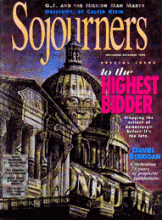Is religious lobbying an oxymoron? To many observers of American politics, lobbying is tawdry bargaining that clashes with the principles of faith. Oregon Sen. Bob Packwood's escapades provide one example. As revealed in his diaries, former Sen. Packwood once traded legislative clout for a job for his ex-wife. If lobbyists hired Georgie Packwood, the Rockefeller Republican's alimony payments would be reduced. With legislation pending before Packwood's committee, the lobbyists complied with Packwood's complicity.
Scandals like Packwood's provide easy prey for the critics of lobbying. When lobbyists, hired by monied interests, work for the immediate fulfillment of their clients' interests, the public good sometimes loses out.
In Washington, several hundred religious lobbyists-or advocates, as they like to be called-also work to influence our government. While they vary dramatically in their political and theological beliefs, most share an anti-elitist view of American politics. Most believe that an elite controls Washington in a manner inconsistent with the demands of faith. Most retain a critical distance from highly paid secular lobbyists.
Religious conservatives perceive a battle against a secular humanist elite. This elite refuses to promote school prayer or to guard the fragile life of the unborn. This elite is oblivious to the family values that have long served as the bedrock of the republic. At a meeting of the Christian Coalition, Gary Bauer, president of the Family Research Council, exhorted delegates by saying, "How superior your values are to the decadent elite of this city....Before this decade is over, your values will prevail."
So-called religious liberals contest a different elite-the corporate-military-industrial complex.
Read the Full Article

